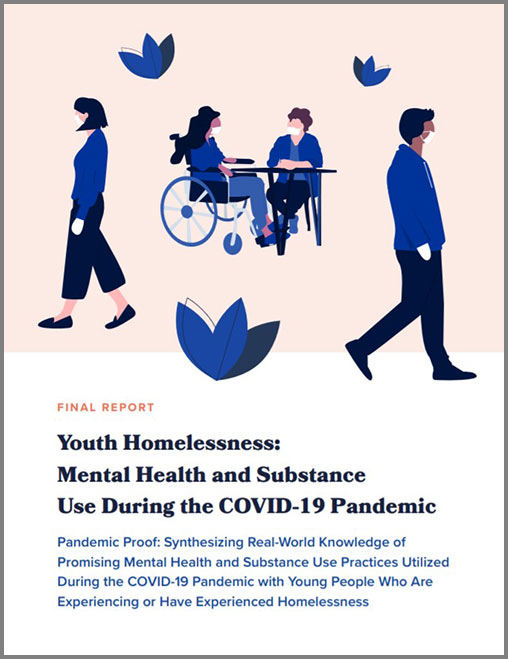The pandemic has exposed a snowstorm of intersecting inequities that Canadian front-line providers and youth with current and past experiences of homelessness are struggling to navigate. This CIHR-funded report explores front-line provider practice adaptations for mental health and substance use during COVID-19 for youth with current and past experiences of homelessness.
An estimated 35,000-40,000 Canadian youth (aged 13-24 years) experience homelessness at some point during the year and at least 6,000 on any given night.
The overwhelming majority have experienced some form of trauma and their challenges related to mental health and substance use have been documented for decades. Struggles with mental health and substance use are not unique to young people currently experiencing homelessness; rather, these challenges persist – and sometimes get worse – for young people who have experienced homelessness in the past.
It is against this backdrop of social and structural inequities and limited guidance in peer-reviewed literature around ‘what works’ to improve outcomes related to mental health, substance use, and sustained exits out of homelessness, that the COVID-19 pandemic came on scene – accelerating our need for an evidence-informed response.
About This Study
The aim of this knowledge synthesis was to deliver real-world evidence on promising mental health and substance use practices utilized by front-line providers working during the COVID-19 pandemic with young people who were experiencing or had experienced homelessness.
However, the evidence we uncovered over the past five months has been less about downstream individual-level interventions and more about the need for upstream structural interventions.
This report includes survey data from 188 front-line providers across Canada, plus three focus groups – two with providers and one with young people who have experienced homelessness. We have endeavored to situate these findings within the rapidly evolving literature on pandemic-related impacts on mental health and substance use. It includes recommendations for practice, research, and policy.
To our knowledge, this is the first synthesis focused on the mental health and substance use needs of young people who are experiencing or have experienced homelessness during the COVID-19 pandemic.
Key messages:
- We must pay special consideration to the mental health and substance use needs of young people with current and past experiences of homelessness, who are more likely than the general population to have pre-existing mental health challenges, struggles with financial hardship, and employment uncertainty.
- Providers must be careful not to inadvertently perpetuate access inequities – already common in this population – by pivoting to phone/virtual care without having a concurrent plan around addressing resource-related barriers to access.
- While it intuitively makes sense to divert young people from the shelter system – especially during a pandemic – we must ensure these young people have the social and economic supports needed not just to survive, but to thrive in the mainstream.


